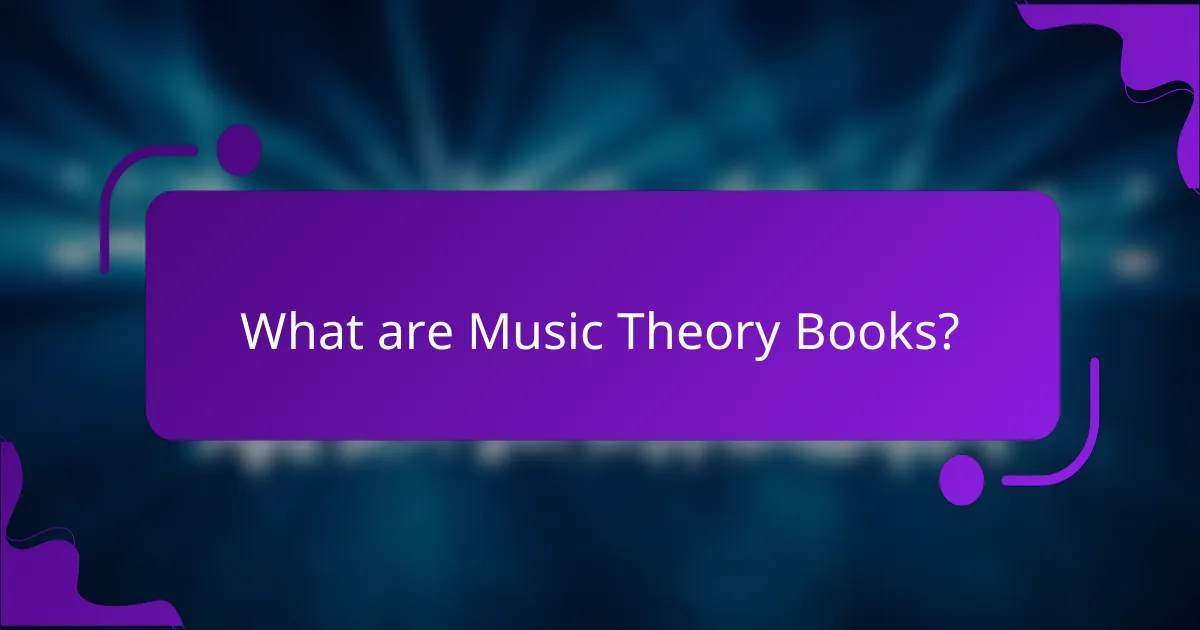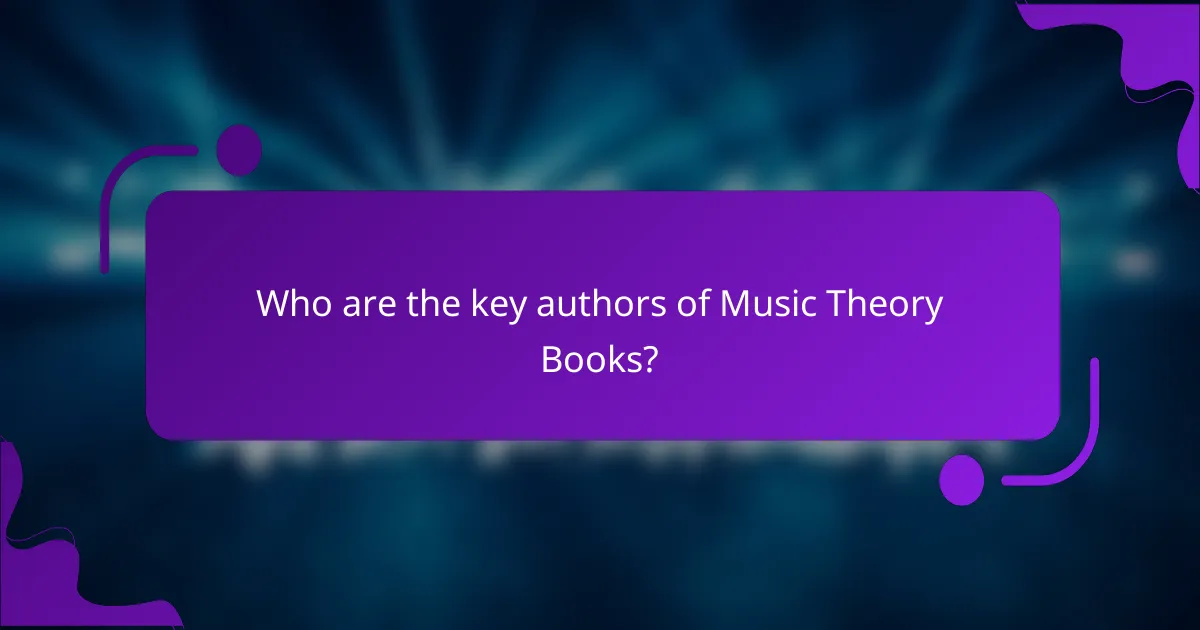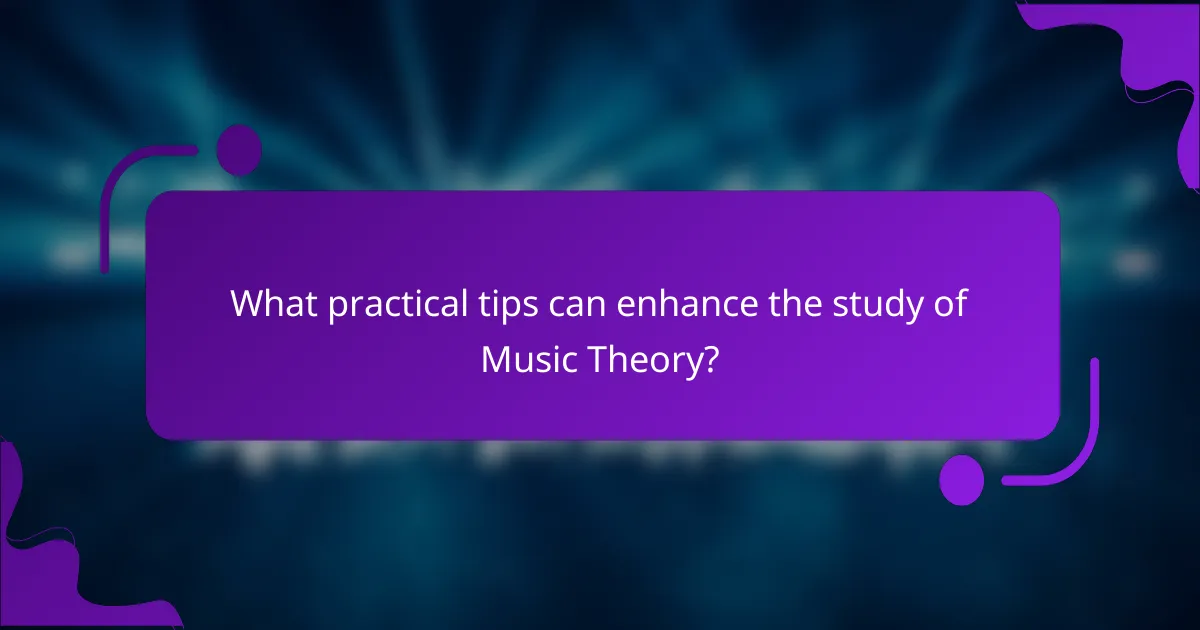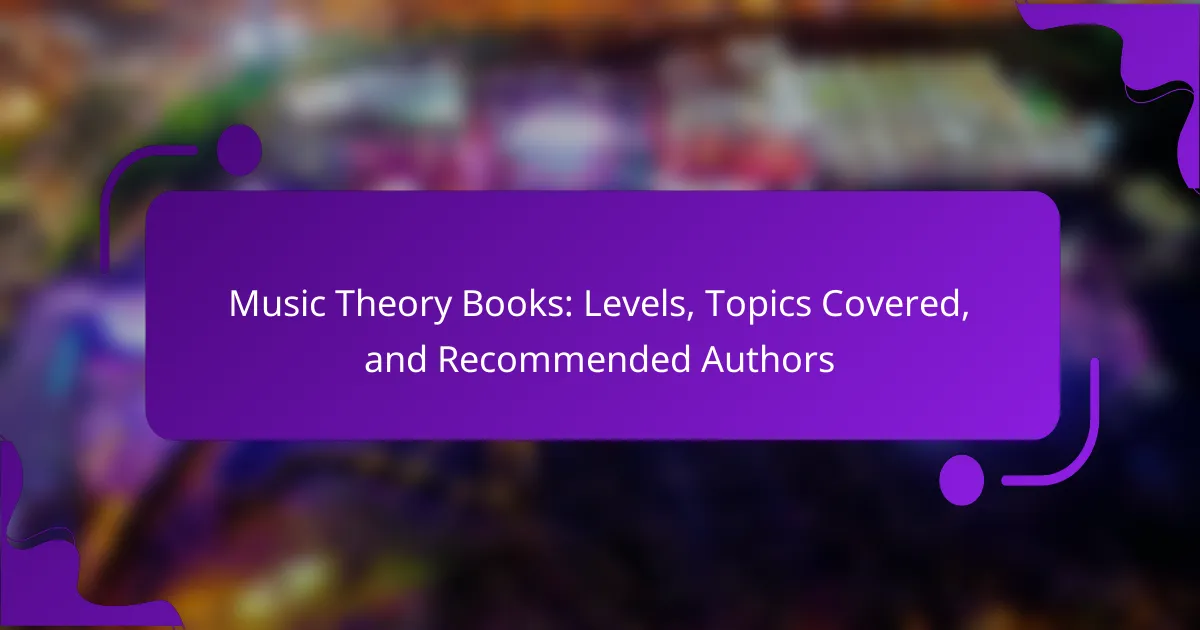Music theory books serve as essential educational resources that elucidate the principles and concepts of music, encompassing topics such as scales, chords, harmony, rhythm, and notation. These books cater to a spectrum of skill levels, from beginners to advanced musicians, and often include exercises, examples, and historical context to enhance learning. Notable authors in the field include Heinrich Schenker, Arnold Schoenberg, Mark Levine, Andrew Surmani, and Steven G. Laitz, whose influential works are widely utilized in music education. To optimize the study of music theory, students are encouraged to engage in regular practice, utilize diverse resources, analyze musical pieces, collaborate in study groups, and set specific learning goals.

What are Music Theory Books?
Music theory books are educational resources that explain the principles and concepts of music. They cover topics such as scales, chords, harmony, rhythm, and notation. These books are designed for various skill levels, from beginners to advanced musicians. They often include exercises and examples to reinforce learning. Many music theory books also provide historical context and applications of theory in composition and performance. Notable authors in this field include Mark Levine and Andrew Surmani. Their works are widely used in music education.
How do Music Theory Books contribute to musical education?
Music theory books enhance musical education by providing structured knowledge and foundational concepts. They cover essential topics such as scales, chords, and harmony. This structured approach helps students understand the relationships between musical elements. Additionally, these books often include exercises and examples that reinforce learning. They serve as valuable references for both students and educators. Research indicates that students who engage with music theory show improved performance skills. For instance, a study by the University of Southern California found that music theory knowledge correlates with higher proficiency in performance. Thus, music theory books play a crucial role in developing comprehensive musical skills.
What foundational concepts are covered in Music Theory Books?
Music theory books cover foundational concepts such as notation, scales, chords, and harmony. Notation includes reading musical symbols and understanding staff lines. Scales provide the basis for melody and key signatures. Chords are essential for harmony and accompaniment. Harmony explores how different notes and chords interact. Rhythm is another critical concept, detailing the timing of music. Form and structure analyze how musical pieces are organized. Each of these concepts builds a comprehensive understanding of music theory.
How do these concepts apply to different music genres?
Music theory concepts apply differently across various music genres. In classical music, these concepts often focus on harmony, counterpoint, and form. For example, the sonata form is a key structure in classical compositions. In jazz, improvisation and complex chord progressions are emphasized. This genre often utilizes modes and extended harmonies. Rock music tends to focus on rhythm, melody, and simple chord structures. It often incorporates power chords and catchy hooks. In electronic music, concepts like texture and sound design are crucial. This genre often explores timbre and layering of sounds. Each genre adapts music theory principles to suit its unique characteristics and audience.
What levels of Music Theory Books are available?
Music theory books are available in several levels. These levels typically include beginner, intermediate, and advanced. Beginner books focus on fundamental concepts like notes, rhythms, and scales. Intermediate books delve into harmony, counterpoint, and form. Advanced books explore complex topics such as orchestration, analysis, and composition techniques. Each level builds on the previous one, providing a structured learning path. This tiered approach helps learners progress effectively through music theory.
What distinguishes beginner Music Theory Books from advanced ones?
Beginner Music Theory Books focus on foundational concepts, while advanced ones delve into complex theories. Beginner books typically cover basic notation, rhythm, and scales. They introduce essential terminology and simple exercises. Advanced books explore intricate topics such as counterpoint, harmony, and orchestration. They often require prior knowledge of music fundamentals. Additionally, advanced texts may include analytical techniques and compositional methods. The target audience for beginner books includes novice musicians, whereas advanced books cater to experienced musicians and composers. This distinction ensures appropriate learning progression in music theory.
How can readers identify the appropriate level for their needs?
Readers can identify the appropriate level for their needs by assessing their current knowledge and experience in music theory. They should start by reviewing the book’s description and intended audience. Beginner books often cover fundamental concepts, while advanced texts delve into complex theories. Readers can also look for sample chapters or reviews to gauge the content’s depth. Additionally, understanding the specific topics addressed in each book can help match it to their learning goals. For instance, those interested in composition might seek books that emphasize harmony and structure. Ultimately, aligning personal objectives with the book’s focus ensures a suitable choice.
What topics are commonly covered in Music Theory Books?
Music theory books commonly cover topics such as notation, scales, chords, and harmony. They also explore rhythm, meter, and musical form. Other frequent subjects include counterpoint, melody writing, and ear training. Additionally, these books often discuss musical analysis and composition techniques. Historical context and styles of music are also included. Many resources address practical applications for musicians. These topics are essential for understanding music’s structure and function.
What are the essential topics for beginners in Music Theory?
Essential topics for beginners in Music Theory include notes and rhythms, scales, intervals, chords, and key signatures. Notes and rhythms form the foundation of musical notation and timing. Scales provide a framework for melody and harmony. Intervals define the distance between notes, crucial for understanding harmony. Chords are built from intervals and are essential for accompaniment. Key signatures indicate the key of a piece, affecting the scale used. These topics are fundamental for developing a comprehensive understanding of music theory.
Which advanced topics should experienced musicians explore?
Experienced musicians should explore advanced topics such as counterpoint, orchestration, and advanced harmony. Counterpoint involves the relationship between independent melodic lines. Orchestration focuses on the arrangement of music for different instruments. Advanced harmony delves into complex chord structures and progressions. Additionally, musicians can study music analysis to understand compositional techniques. They may also explore microtonality, which involves pitches outside the traditional Western scale. Lastly, improvisation techniques can enhance creativity and adaptability in performance. These topics deepen musicians’ understanding and enhance their skills.
How do Music Theory Books vary in format and style?
Music theory books vary in format and style primarily through their presentation and pedagogical approach. Some books are structured as traditional textbooks, featuring chapters that build progressively on concepts. Others adopt a workbook format, including exercises and practical applications for hands-on learning.
Additionally, some music theory books focus on specific genres, such as jazz or classical, tailoring their content to those styles. Visual aids, such as diagrams and charts, are often used in many books to illustrate complex ideas clearly.
Moreover, the writing style can range from academic and formal to conversational and accessible, catering to different audiences. Some authors include historical context or anecdotes to engage readers, while others focus strictly on technical aspects.
These variations allow readers to choose books that align with their learning preferences and goals. For example, “Tonal Harmony” by Stefan Kostka and Dorothy Payne is a comprehensive textbook, while “The Complete Musician” by Steven G. Laitz provides a more integrated approach to music theory.
What are the differences between textbook-style and workbook-style Music Theory Books?
Textbook-style music theory books primarily focus on presenting concepts and information in a structured format. They provide detailed explanations, examples, and theoretical frameworks. Workbook-style music theory books emphasize practice and application. They include exercises, quizzes, and activities that reinforce the concepts learned. Textbooks often serve as comprehensive resources for understanding music theory. Workbooks are designed to facilitate learning through hands-on practice. The differences lie in their approach: textbooks prioritize theory, while workbooks prioritize practical application. This distinction helps learners choose the right type of resource based on their study preferences.
How do online resources complement traditional Music Theory Books?
Online resources enhance traditional music theory books by providing interactive and multimedia content. They offer video tutorials that illustrate complex concepts visually. This aids comprehension for learners who benefit from seeing practical applications. Additionally, online platforms often include quizzes and exercises for immediate practice and feedback. This interactive element helps reinforce learning in a way that static books cannot. Furthermore, online resources are frequently updated with the latest theories and trends in music. This ensures learners have access to current information. In contrast, traditional books may become outdated over time. Overall, the combination of both formats caters to diverse learning styles and preferences.

Who are the key authors of Music Theory Books?
Key authors of music theory books include Heinrich Schenker, Arnold Schoenberg, and Steven G. Laitz. Heinrich Schenker is known for his influential work “Harmony” and the Schenkerian analysis method. Arnold Schoenberg authored “Structural Functions of Harmony,” which explores harmonic structure. Steven G. Laitz’s “The Complete Musician” integrates music theory, ear training, and keyboard skills. These authors are recognized for their significant contributions to the field of music theory. Their works are widely used in academic settings and are foundational texts for students and educators alike.
Which authors are considered authorities in Music Theory?
Authors considered authorities in Music Theory include Heinrich Schenker, Arnold Schoenberg, and Steven Laitz. Heinrich Schenker is known for his theories on tonal structure and voice leading. Arnold Schoenberg contributed significantly to twelve-tone technique and music analysis. Steven Laitz is recognized for his accessible textbooks on music theory for students. Their works are widely used in academic settings, reinforcing their authority in the field.
What contributions have these authors made to the field?
The authors have significantly advanced the field of music theory through their comprehensive texts. They have introduced innovative concepts that enhance understanding of musical structures. Their works cover a wide range of topics, from basic principles to advanced analytical techniques. These contributions have been instrumental in shaping contemporary music education. Notable authors include Allen Forte, who developed set theory in music analysis. Their books are widely used in academic settings, influencing both teaching and learning practices. The authors’ unique perspectives have fostered deeper insights into music composition and analysis. Their contributions continue to serve as foundational resources for students and educators alike.
How do readers evaluate the credibility of Music Theory authors?
Readers evaluate the credibility of Music Theory authors through several key factors. They assess the author’s academic qualifications and professional background. Authors with advanced degrees in music theory or related fields tend to be viewed as more credible. Readers also consider the author’s publication history. A strong portfolio of peer-reviewed articles or books enhances credibility. Additionally, the reception of the author’s work by the academic community matters. Positive reviews and citations in scholarly literature reinforce an author’s reputation. Readers may also look at the author’s practical experience in music performance or teaching. This hands-on expertise can lend authority to their theoretical insights. Finally, the clarity and depth of the author’s writing influence how readers perceive their credibility. Clear, well-structured content is often associated with knowledgeable authors.
What are some highly recommended Music Theory Books by these authors?
“Tone Deaf” by David Huron is a highly recommended music theory book. It explores the cognitive aspects of music perception. “The Complete Musician” by Steven G. Laitz is another essential read. It covers music theory, ear training, and keyboard skills. “Tonal Harmony” by Stefan Kostka and Dorothy Payne is widely used in academic settings. It provides a thorough foundation in tonal music theory. “How to Write Songs on Guitar” by Rikky Rooksby is ideal for songwriters. It combines theory with practical application for guitar. Each of these books is recognized for its clear explanations and comprehensive coverage of music theory concepts.
What are the standout features of each recommended book?
It is not possible to answer the question as no specific recommended books have been provided in the context. Without the titles or details of the books, I cannot identify their standout features.
How do these books cater to different levels of expertise?
Music theory books cater to different levels of expertise by offering varying depths of content and complexity. Beginner books introduce fundamental concepts such as notes, scales, and basic rhythms. Intermediate books expand on these concepts, covering harmony, chord progressions, and more complex rhythms. Advanced books delve into intricate theories like counterpoint, orchestration, and music analysis. Each level is designed to build upon the previous one, ensuring a gradual learning curve. Additionally, books often include exercises and examples tailored to the reader’s skill level, reinforcing understanding. This structured approach allows learners to progress at their own pace while developing a comprehensive understanding of music theory.

What practical tips can enhance the study of Music Theory?
To enhance the study of Music Theory, students should practice regularly. Consistent practice reinforces concepts and improves retention. Additionally, using a variety of resources is beneficial. Books, online courses, and apps provide diverse perspectives. Engaging with music actively is also important. Analyzing pieces and composing helps apply theoretical knowledge. Joining study groups can foster collaboration and deeper understanding. Teaching concepts to others solidifies personal comprehension. Lastly, setting specific goals can guide progress and maintain motivation. These strategies collectively enhance the study experience in Music Theory.
How can learners effectively use Music Theory Books for self-study?
Learners can effectively use Music Theory Books for self-study by following a structured approach. First, they should select books that match their current skill level. Beginners may benefit from introductory texts that cover basic concepts. Intermediate learners should choose books that delve into more complex topics.
Next, learners should set specific goals for each study session. This could involve mastering a particular concept or completing exercises in the book. Regular practice is essential for reinforcing knowledge.
Additionally, learners should take notes while studying. Writing down key concepts helps with retention and understanding. They can also summarize each chapter to solidify their knowledge.
Using supplementary resources can enhance the learning experience. Online tutorials, videos, and apps can provide additional perspectives on challenging topics.
Finally, learners should periodically review previous material. This helps to reinforce knowledge and ensure a solid foundation as they progress.
What strategies can be employed to retain complex concepts?
Employing active learning strategies can enhance retention of complex concepts. Techniques such as summarization help distill information into key points. Visualization aids comprehension by creating mental images of concepts. Spaced repetition reinforces memory over time, improving long-term retention. Teaching others solidifies understanding and identifies knowledge gaps. Utilizing mnemonic devices simplifies complex information into memorable formats. Engaging in discussions fosters deeper insights and clarifies misunderstandings. Research supports these methods, indicating that active engagement significantly improves retention rates in educational contexts.
How can practice and application improve understanding of Music Theory?
Practice and application enhance understanding of Music Theory by reinforcing concepts through real-world usage. Engaging in exercises solidifies theoretical knowledge. For example, playing scales helps internalize their structure and function. Composing music allows for exploration of harmonic and melodic principles. Analyzing pieces deepens insight into form and style. Research indicates that active engagement leads to better retention of information. A study by the University of Southern California found that students who applied theory concepts in practice scored higher on assessments. Thus, practice and application are essential for mastering Music Theory.
Music theory books are essential educational resources that explain the principles and concepts of music, covering topics such as scales, chords, harmony, rhythm, and notation for various skill levels. These books enhance musical education by providing structured knowledge and practical exercises, thereby improving performance skills. The article explores foundational concepts, genre-specific applications, different levels of books, notable authors, and practical tips for effective self-study. Key authors in the field, such as Heinrich Schenker and Steven G. Laitz, are highlighted for their significant contributions to music theory education.
